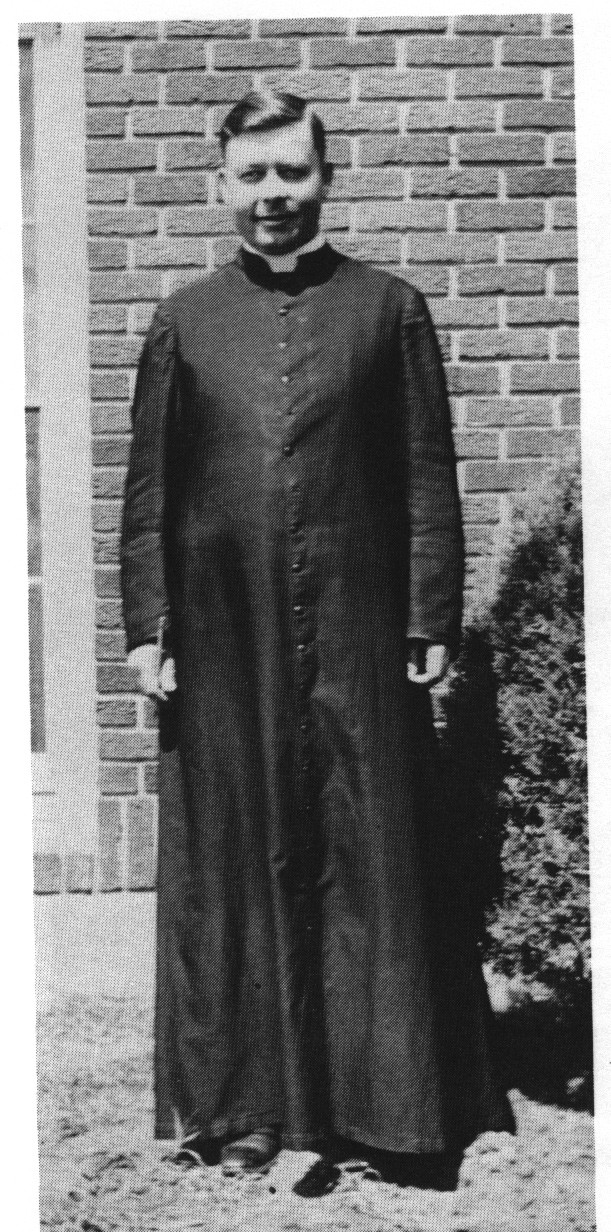The institution we know today as Newman University owes a good part of its existence to the tireless efforts of its first president, Monsignor Leon A. McNeill.
McNeill and his work as president of what was then Sacred Heart Junior College will be the focus of a “Mission Talk” presented by Newman University historian and archivist Charlotte Rohrbach, ASC, Ph.D. The talk will be at 7 p.m. Wednesday, Nov. 20, in the Dugan-Gorges Conference Center on the Newman campus.

McNeill, who was Diocesan Superintendent of Schools until 1945, oversaw the administration and supervision of parochial schools as well as Catholic training of the teaching sisters of the diocese, which covered the southern half of Kansas. Recognizing the need to have teachers prepared academically and imbued with Catholic philosophy and Catholic intellectual tradition, McNeill led a “unique experiment” beginning in 1929 in downtown Wichita for those members of religious congregations who were teaching in the diocese’s schools.
In her talk, Rohrbach will review at least three interpretations of how the experiment entered a new phase. McNeill not only successfully organized and carried out the eight-week summer session for the diocesan sisters during the summer of 1933, but also undertook an arduous “to-do” list related to the upcoming founding of the college. His actions included working with religious congregations teaching in the diocese to inform them of a full-year college program and begging for sister students to attend, identifying professors for the courses, using his contacts to overcome the problematic issues of starting a Catholic college during the depths of the Great Depression with only a few months lead time, and planning all the minute details which allowed Sacred Heart Junior College to open its doors in the fall to 33 students who enrolled in the new college’s freshman class.
A front page article in the Sept. 16, 1933 edition of the Catholic Advance noted that on Sept. 12, a “tremendous step forward in the development of the Wichita diocesan educational program was taken . . . as thirty-three students began their higher studies at Sacred Heart Junior College, the first Catholic institution of higher learning in the Diocese of Wichita.” In the article The Most Rev. A. J. Schwertner, then Bishop of the Wichita Diocese, pleaded for the “hearty cooperation of the clergy, the religious, and the laity in making the new institution serve its high purposes and accomplish its aims.”
McNeill would have preferred to wait a few years before opening the college so that people could be trained to serve as administrators and professors, but a ruling by the Kansas Board of Education made that desire no longer viable. Rohrbach will provide the “what” and the “why” of this Board of Education ruling.
McNeill stated in a 1978 interview that when the college opened, “We had no personnel, no finances, and very limited facilities.” Still, McNeill and the Adorers of the Blood of Christ, founders of the college, forged ahead and put those mandatory pieces in place during the first few years. It was a labor of love but one filled with challenges, which included completing all documentation needed for Kansas Board of Education accreditation. This step would add Sacred Heart to many regional and national directories, which McNeill and others hoped would increase the number of students, both sisters and lay women.
McNeill valued informed opinions and suggestions of others, some of which became reality in the early years of the college. One example was restoring a summer program of studies for those not able to attend during the normal college semesters. During his 13-year tenure as president, McNeill undertook a large variety of actions to ensure the survival and growth of the college.
His efforts did not go unnoticed. In a letter dated Sept. 25, 1946, the school’s second president, Rev. Charles A. Smith, wrote:
“The faculty of Sacred Heart is well aware that you deserve to be remembered as the main inspiration and tireless worker of and for all that has been accomplished at the College since it opened its doors thirteen years ago. We fully recognize that the progress and reputation of the institution are justly accounted for because you gave yourself generously to the task of molding the fabric of the college. We can never express in words the debt we owe you for the prestige enjoyed by the College which your efforts fostered and produced.”
Rohrbach will present more details of McNeill’s term as president at the Nov. 20 Mission Talk.
“I urge everyone interested in Catholic education to attend,” Rohrbach said. “I especially encourage parish groups to come and learn about McNeill’s ‘unique experiment,’ and how its progress was watched and modeled in other parts of the country.”
The Talk will also be presented from noon to 1 p.m. on Tuesday, Nov. 19 in the Tarcisia Roths, ASC Alumni Center. Reservations are required for the noon talk only and will be accepted through Nov. 18. A complimentary buffet lunch will be provided for the first 40 who register.
For more information or to make reservations for the Nov. 19 luncheon talk no later than Nov. 18, contact Rohrbach at 316-942-4291, ext. 2167, or [email protected].
The third presentation in the series of Mission Talks will be Feb. 11 and 12, and will explore McNeill’s involvement with the Catholic Rural Life movement. The final talk for this academic term, on April 1 and 2, will cover McNeill and his work with Catholic Welfare and Action. All presentations are free and open to the public.
